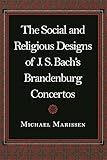The Social and Religious Designs of J. S. Bach's Brandenburg Concertos / Michael Marissen.
Material type: TextPublisher: Princeton, NJ : Princeton University Press, [1999]Copyright date: ©1995Edition: Course BookDescription: 1 online resource (168 p.) : 5 music examplesContent type:
TextPublisher: Princeton, NJ : Princeton University Press, [1999]Copyright date: ©1995Edition: Course BookDescription: 1 online resource (168 p.) : 5 music examplesContent type: - 9780691006864
- 9781400821655
- 784.24092
- ML410 .B13 M27 2001
- online - DeGruyter
- Issued also in print.
| Item type | Current library | Call number | URL | Status | Notes | Barcode | |
|---|---|---|---|---|---|---|---|
 eBook
eBook
|
Biblioteca "Angelicum" Pont. Univ. S.Tommaso d'Aquino Nuvola online | online - DeGruyter (Browse shelf(Opens below)) | Online access | Not for loan (Accesso limitato) | Accesso per gli utenti autorizzati / Access for authorized users | (dgr)9781400821655 |
Browsing Biblioteca "Angelicum" Pont. Univ. S.Tommaso d'Aquino shelves, Shelving location: Nuvola online Close shelf browser (Hides shelf browser)
Frontmatter -- Contents -- Acknowledgments -- INTRODUCTION. Bach's Musical Contexts -- CHAPTER ONE. Relationships between Scoring and Structure in Individual Concertos -- CHAPTER TWO. The Six Concertos as a Set -- CHAPTER THREE. Lutheran Belief and Bach's Music -- Appendix 1. Text-Critical Notes on Early Copies of the Sixth Brandenburg Concerto -- Appendix 2. Notes on Bach's Notation of the Gamba Parts in the Margrave of Brandenburg's Dedication Score -- Works Cited -- Index
restricted access online access with authorization star
http://purl.org/coar/access_right/c_16ec
This new investigation of the Brandenburg Concertos explores musical, social, and religious implications of Bach's treatment of eighteenth-century musical hierarchies. By reference to contemporary music theory, to alternate notions of the meaning of "concerto," and to various eighteenth-century conventions of form and instrumentation, the book argues that the Brandenburg Concertos are better understood not as an arbitrary collection of unrelated examples of "pure" instrumental music, but rather as a carefully compiled and meaningfully organized set. It shows how Bach's concertos challenge (as opposed to reflect) existing musical and social hierarchies. Careful consideration of Lutheran theology and Bach's documented understanding of it reveals, however, that his music should not be understood to call for progressive political action. One important message of Lutheranism, and, in this interpretation, of Bach's concertos, is that in the next world, the heavenly one, the hierarchies of the present world will no longer be necessary. Bach's music more likely instructs its listeners how to think about and spiritually cope with contemporary hierarchies than how to act upon them. In this sense, contrary to currently accepted views, Bach's concertos share with his extensive output of vocal music for the Lutheran liturgy an essentially religious character.
Issued also in print.
Mode of access: Internet via World Wide Web.
In English.
Description based on online resource; title from PDF title page (publisher's Web site, viewed 30. Aug 2021)









